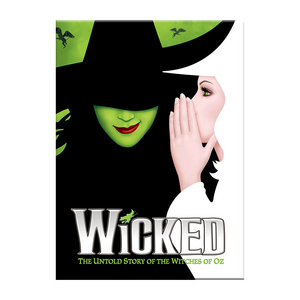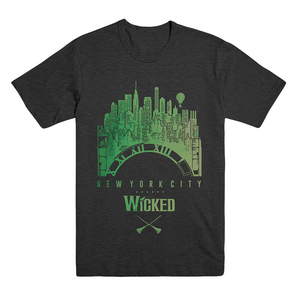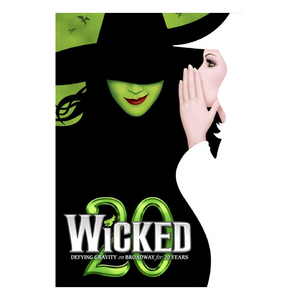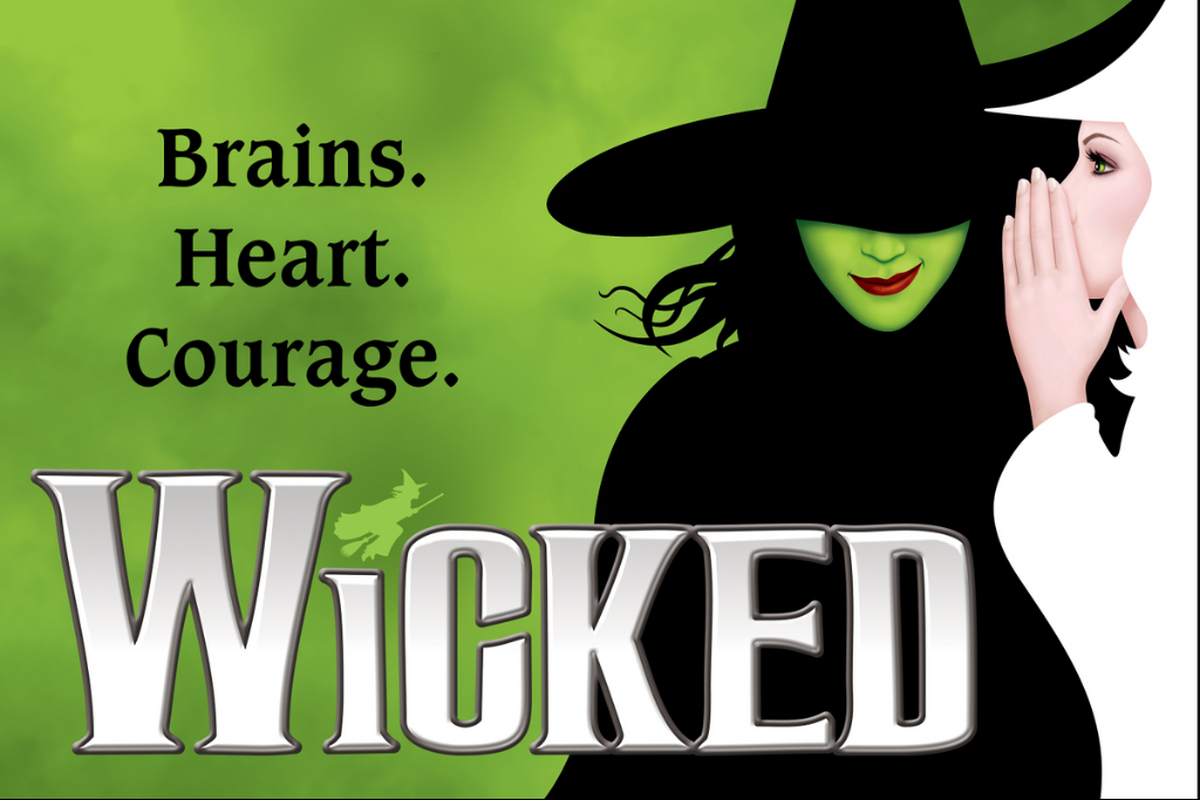BWW Reviews: WICKED at the Benedum Center
The arrival of the Wicked National Tour in any town has become the twenty-first century equivalent of the circus coming to town. Fans, tourists, die-hards and casual theatre lovers flock to buy tickets, pick up souveniers, laugh, cry, cheer and applaud uproriously for a musica that, only ten years old, has already established itself as a modern classic. As this Equity tour comes to Pittsbugh and makes its home at the Benedum center for the next few weeks, I made my first visit to the show since seeing the now-legendary original cast nearly ten years ago. To paraphrase Madam Morrible, I expected to be disappointed... but I was not. The combination of a stunningly talented cast, Joe Mantello's fast-moving and stylish direction, Eugene Lee's outrageous steampunk sets, and Stephen Schwartz's iconic score guarantees that audiences will get their money's worth at this witch hunt.
I can still vividly remember being a precocious and somewhat pretentious fourteen-year-old, outraged at what the Broadway musical Wicked had done to the source material, Gregory Maguire's tricky and Kubrick-esque Wicked: The Life and Times of the Wicked Witch of the West. Where was the darkness, the sex and violence, the political intrigue? In Maguire's Oz, androids carry out assassinations, the green girl's biological gender is left deliberately vague, and it certainly isn't dancing that goes on at the Ozdust Ballroom (you don't want to know, trust me). Over the years, however, Stephen Schwartz's music and lyrics and Winnie Holzman's book gradually won me over, and by the time the musical hit its five-year anniversary, I had learned to love it- not for what it could have been, but for what it was. Wicked may not be the totalitarian nightmare world of the novel, but as a family-friendly, decidedly post-Disney-Renaissance musical, it succeeds with flying colors.
The plot of Wicked is probably familiar by now to most BWW readers, but just in case, the musical tells the story of Elphaba Thropp (Alison Luff), the "unnaturally green" daughter of one of Oz's political officials, and her unlikely friendship and rivalry with Galinda Upland (Gina Beck), a beautiful rich girl with more charm than brains and more ambition than talent for magic or academics. When Elphaba shows an unexpected talent for magic, and Galinda shows an unexpectedly kind side, they both attract the notice of Shiz University headmistress Madam Morrible (the very funny Alison Fraser), and both quickly become embroiled in political intrigue with the Wizard of Oz himself (John Davidson). Simultaneously, they find themselves in a love triangle with rich, affable slacker Fiyero (Curt Hansen), whose growing interest in Elphaba and her political activism makes him question his own disaffectedness.
Performers in a famous musical like Wicked, which launched Idina Menzel and Kristin Chenoweth from Broadway regulars to stars of stage, film and television, have big shoes to fill. The fact that the show has only one English-language recording, and a best-seller at that, means that the leads in any given performance are competing with the well-ingrained memories of the original cast's idiosyncratic voices and unique comic and dramatic timing. Happily, the current touring cast gave incredible performances across the board, enough to make me forget my memories of actors past as I watched. As Elphaba, the heroine/antiheroine of the play, Alison Luff brings a vulnerability, quirkiness and sense of humor to the role that made the young witch, who can sometimes come off as cold or standoffish, genuinely lovable. Rather than relying on stadium-sized powerhouse vocals and jaw-dropping riffs, Luff sings and acts her way genuinely through the songs, making the famous last 90 seconds of "Defying Gravity," as Elphaba ascends to the skies over the soldiers who chase her a moment not just of triumph and empowerment, but of fear and bittersweetness. Rather than snarl out the phrase, "and nobody in all of Oz, no Wizard that there is or was," as Idina Menzel famously did, Luff gasps the words out as if fighting the urge to cry, or to scream.
Gina Beck, a veteran of the West End production, plays the other half of Wicked's dynamic duo with comic flair and serious vocal chops. Her Galinda, later rechristened Glinda, admirably walks the thin line between simplicity and stupidity, creating a character we can laugh at, but also feel for. Her transitions between belting, light pop mezzo and legit operatic soprano are effortless, and the facets of her voice blend together even better than Chenoweth's did. Curt Hansen's Fiyero is charming and very funny, and his featured number, "Dancing Through Life," quickly wins the audience over by showcasing Hansen's impressive dancing chops. However, his bright and youthful pop tenor and clean-cut Disney prince appearance leave somewhat less contrast than usual between debauched bad-boy Fiyero and nerdy, well-meaning Boq, a Munchkin with a crush on Galinda. Jesse JP Johnson, in the role of Boq, is all fun and games in the first act, but his dysfunctional and enabling relationship with Elphaba's sister Nessarose, played with understated and slow-boiling anger and resentment by Jaime Rosenstein, provide dramatic backbone in Act 2.
In a show as colorful and stylized as Wicked, the supporting cast and ensemble need lots of flash and flair to rise above the chaos, and this cast more than delivers. Alison Fraser's Madame Morrible, whose Mayfair upper-crust accent is so thick it is almost a parody of Dame Maggie Smith of Downton Abbey, generates enormous laughs in almost every scene she appears in. Her partner in crime, John Davidson's Wonderful Wizard, leaves the threat and smolder to Fraser, and instead gives smiles, warmth and country-style charm to everyone he encounters. Strangely enough, this makes his Wizard scarier than the pricklier Madam Morrible, and his vaudeville-style paean to moral equivalency, "Wonderful," artfully portrays him as both entirely corrupt and genuinely convinced of his own good intentions. Davidson's folksy, avuncular warmth and song-and-dance rhythms call to mind Schwartz's earlier career of pop-vaudeville scores for Godspell, Pippin and The Magic Show, and the presence of his charmingly old-fashioned song bridges the gap between old-school Schwartz and the darker, lusher and more cinematic scores to Children of Eden and Wicked that Schwartz reinvented himself with in the last few decades. Although everyone in the ensemble plays multiple roles and dances strikingly to Wayne Cilento's choreography and musical staging, Kevin McMahon, who plays a series of small roles as authority figures in Oz, stands out most of all for his portrayal of Elphaba's unloving father.
If Wicked has a weak link, not that it has had great effect on the show's success, it would be the book by Winnie Holzman. Although generally enjoyable, Holzman has a tendency to use the gradual connections of Elphaba's story to the legendary iconography of The Wizard of Oz as punch lines, breaking up dramatic tension with a large audience laugh moment. This is only a minor weakness in the long run, as the script's kinder-and-gentler take on Maguiere's dystopian fantasy provides genuine heart, leading to the cathartic final duet, "For Good," which Beck and Luff sing beautifully together. When the curtain rises for bows a few minutes later, audiences may be as surprised as I was by how relatively small the cast really is. It barely seems possible that so few performers can create so much magic.


 Wicked Logo Magnet
Wicked Logo Magnet Wicked Fitted Chance to Fly Tank
Wicked Fitted Chance to Fly Tank Unisex NYC Clock Tee V3
Unisex NYC Clock Tee V3 Wicked 20th Anniversary Program
Wicked 20th Anniversary Program
